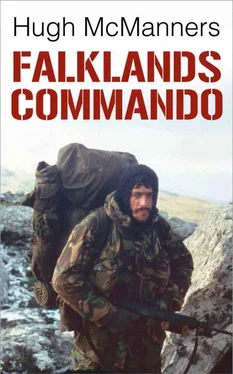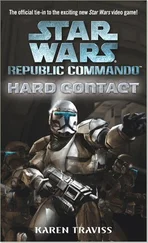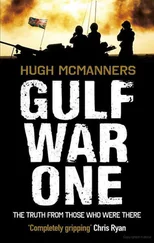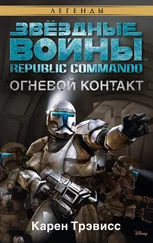Hugh McManners - Falklands Commando
Здесь есть возможность читать онлайн «Hugh McManners - Falklands Commando» весь текст электронной книги совершенно бесплатно (целиком полную версию без сокращений). В некоторых случаях можно слушать аудио, скачать через торрент в формате fb2 и присутствует краткое содержание. Город: London, Год выпуска: 2014, ISBN: 2014, Издательство: Nightstrike Publishing, Жанр: nonf_military, Биографии и Мемуары, на английском языке. Описание произведения, (предисловие) а так же отзывы посетителей доступны на портале библиотеки ЛибКат.
- Название:Falklands Commando
- Автор:
- Издательство:Nightstrike Publishing
- Жанр:
- Год:2014
- Город:London
- ISBN:978-0-992-81540-0
- Рейтинг книги:4 / 5. Голосов: 1
-
Избранное:Добавить в избранное
- Отзывы:
-
Ваша оценка:
- 80
- 1
- 2
- 3
- 4
- 5
Falklands Commando: краткое содержание, описание и аннотация
Предлагаем к чтению аннотацию, описание, краткое содержание или предисловие (зависит от того, что написал сам автор книги «Falklands Commando»). Если вы не нашли необходимую информацию о книге — напишите в комментариях, мы постараемся отыскать её.
Falklands Commando — читать онлайн бесплатно полную книгу (весь текст) целиком
Ниже представлен текст книги, разбитый по страницам. Система сохранения места последней прочитанной страницы, позволяет с удобством читать онлайн бесплатно книгу «Falklands Commando», без необходимости каждый раз заново искать на чём Вы остановились. Поставьте закладку, и сможете в любой момент перейти на страницу, на которой закончили чтение.
Интервал:
Закладка:
The idea of returning once more to those two places and doing further NGS raids really did not thrill Nick and me very much at that stage. Nevertheless we started thinking, as we had so many times before, about what we would have to do to get ready to go out again on operations.
But this time, it was with what we hoped was the reasonable expectation that our efforts would prove unnecessary.
To the west (to our right), there was much helicopter activity as our Sea Kings and Gazelles took advantage of the ceasefire to bring up rations and stores, evacuate casualties and shuffle people round. We tuned to the BBC World Service every hour to find out what was happening.
The programme was interrupted for a live announcement in Parliament. We heard the Prime Minister in the House of Commons announce that “White flags are now flying over Stanley”. Nick and I checked the town very carefully with our Swiftscope. I assume there was a degree of rhetorical license in that announcement, as at that actual moment we couldn’t see any white flags at all.
At some stage in all this confusion Major General Jeremy Moore went to the Governor’s house in Port Stanley. He met General Menendez, and they signed the Instrument of Surrender, with the word ‘unconditional’ crossed out at Menendez’ insistence.
The Paras were on the road ‘tabbing’ eastwards into Port Stanley, with Captain Chris Brown on the radio giving us a blow-by-blow description of the scene as they proceeded.
They approached the town through the now destroyed Royal Marine barracks at Moody Brook (previously home to NP 8901), past gun positions that had received our attentions, and eventually the racecourse. There were many more artillery guns than any of us had imagined, all virtually new and with unexpectedly large piles of ammunition around them.
As they progressed, whole blocks of target numbers became unsafe and were cancelled by John Keeling’s regimental HQ. The net became chatty. Sgt John Rycroft had remained on duty in the SACC command post during an air raid, to be injured by a neon light when a thousand-pound bomb landed nearby. There were solicitous enquiries over the radio as to his “light injuries”, was he making “light of them?”, did he feel “light-headed?” etc. The teams that were in the advance on Port Stanley took orders for Colt 45’s and sniper rifles.
WO2 ‘Brum’ Richards, from one of the gunships, transmitted a timely reminder that hostilities still continued. Amid all the badinage, a sense of wariness continued.
The surrender became official at 9 p.m. local time, which for us, on Greenwich Mean Time, was 2359 hours. At that moment I lit my last cigar (prior to giving up smoking) in celebration, and somebody made a cup of tea. We made our weapons ‘safe’, i.e. took off the magazine, cleared the round from the chamber and applied the safety catch. The NGS control net closed down until the next morning, and suddenly it was all over.
The next morning we formally closed down the NGS net for good, having finalised arrangements for the recovery of all our NGS teams as much as we could at that stage.
As the stations were signing off for the last time, a voice with an Argentine accent came on the air:
“You may have won Puerto Argentino, but the war is not over,” said this voice.
There was a pause on the net, then quick as a flash everyone came up in order:
“41 Roger Out.”
“41 Alpha Roger Out.”
“41 Bravo Roger Out.”
“41 Charlie Roger Out” etc… in drop-dead, split-second, utterly perfect radio procedure.
Chapter 12. Waiting to Go Home
Back in UK, the surrender took Whitehall by surprise.
The experienced General Dick Trant was hurriedly brought into the MoD to talk to the press. The civil servant Ian MacDonald, whose ‘speaking clock’ voice had announced the disasters and successes with a ridiculous lack of animation or helpful detail, finally left the MoD’s public relations department.
The Army’s PR director Brigadier David Ramsbotham said that the whole thing had been a classic example of how not to manage public relations:
“There’d been no arrangements for anything, like the getting back of photographs to UK, no briefing of foreign press who felt they were only hearing an English voice and were very suspicious of what they were hearing…. They could go to Argentina and hear all about it from them, but not from us. It was a total nonsense and need not have been.
Earlier I’d written a paper saying how as soon as hostilities were over, we had to get parties of foreign media out to the Falklands before our forces came home, so they could see everything for themselves, then tell the story in their own way. I suggested I should organise this and go with them.
As is the way of the MoD, it was then assumed that I was going, so I did.
I left UK and travelled south to Ascension Island en route to the Falkland Islands themselves, with Governor Rex Hunt.”
So… Naval Gunfire Forward Observation Team Number One were left stuck on Beagle Ridge in the driving snow without rations, while the rest of the victorious troops were marching into Port Stanley, where no doubt they would be warmly welcomed with whiskey and all the garlands and favours of war. In lieu of this, we passed round yet another gungy mug of peat-water tea. If you can’t take a joke, you should not have joined.
With ‘ENDEX’ declared, all anyone wanted to do was go home. But there were the wounded to tend and collect, the dead to bury, and a very large and unknown number of prisoners of war. Units were spread out in the positions they’d reached when the final whistle blew.
Stanley was the place with shelter and, being the ultimate objective, the infantry units got themselves there as quickly as possible.
The Divisional and Brigade Staffs were left with a new situation and a huge set of problems. In just a few moments, they’d gone from being totally dedicated to winning a war, to a very serious ‘post-exercise’ situation.
At the same time, mainland Argentina – as ever totally irresponsible in its amateurish jingo’ism, declared its continuation of the war. The Argentine Air Force has never been defeated and was frighteningly effective. It was thought possible the air attacks might start again.
We were greatly outnumbered by thousands of well-armed Argentinians, who were angry. They had to be looked after – fed, watered and sheltered, lest anarchy develop. In those first hours the surrender, the British Staff walked a tightrope, hoping it would hold.
For most of the troops still out in the mountains, any sort of movement was severely restricted by uncharted Argentine minefields, which continued to claim casualties. Our regiment sustained such a casualty only hours after the cease-fire.
Quartermaster Major Brian Armitage was advancing in the wake of the advance in his BV over-snow vehicle (a two-seater caterpillar-tracked vehicle that went very well over the boggy ground) but drove over a land mine, which threw the vehicle up in the air wrecking the rear, but thankfully not the cab. The driver was OK, but Brian had several vertebrae damaged and was unable to move. He lay in the open for some thirteen hours with the driver keeping him warm, before another vehicle happened upon them.
On Beagle Ridge the snow and wind-driven sleet continued. The next day it was rumoured we’d be flying out. We packed everything up except our shelter, as we knew promises of flights-out to be extremely fickle things. A large pile of leftover missiles and ammunition was gathered and carried down the hillside to the flat area that would become the landing-site. We posed for photographs on the summit of Beagle Ridge with a Union Flag that someone had brought for emergency identification purposes. The wind was so strong it was very hard to remain upright. The release of tension that cessation of hostilities brought is evident in these photos.
Читать дальшеИнтервал:
Закладка:
Похожие книги на «Falklands Commando»
Представляем Вашему вниманию похожие книги на «Falklands Commando» списком для выбора. Мы отобрали схожую по названию и смыслу литературу в надежде предоставить читателям больше вариантов отыскать новые, интересные, ещё непрочитанные произведения.
Обсуждение, отзывы о книге «Falklands Commando» и просто собственные мнения читателей. Оставьте ваши комментарии, напишите, что Вы думаете о произведении, его смысле или главных героях. Укажите что конкретно понравилось, а что нет, и почему Вы так считаете.












